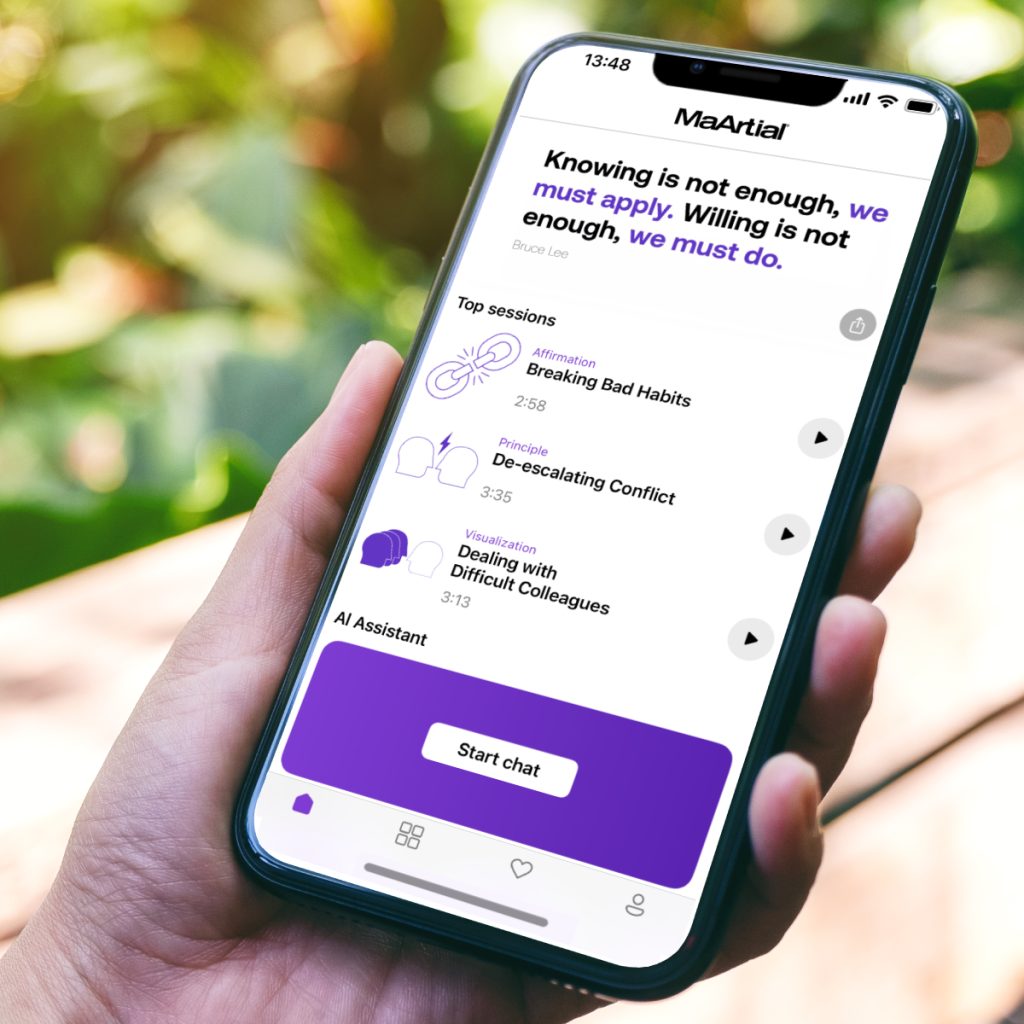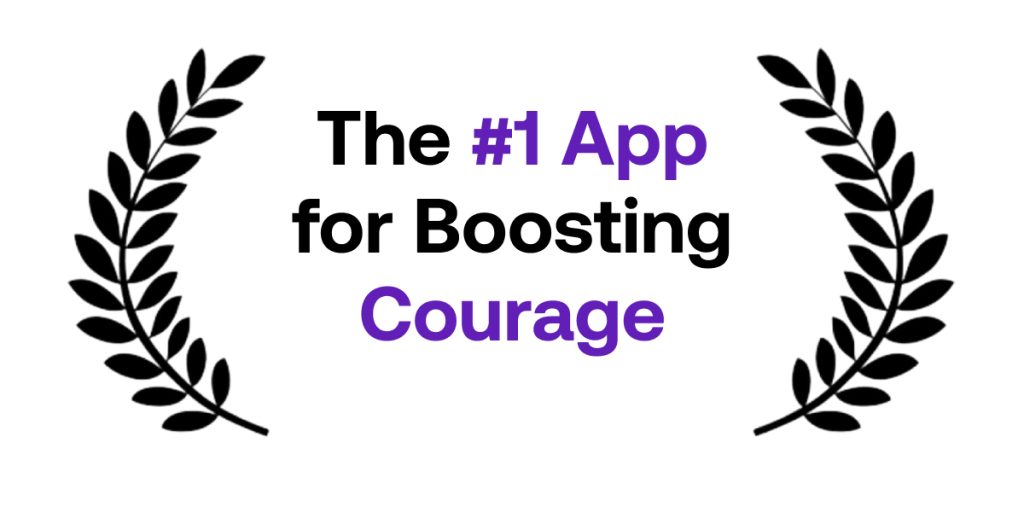Anxiety is not an uncommon issue; it’s one that affects 19.1% of Americans 18 and over.
For its counterpart, depression, it was 14.8 million people in 2020.
While those might seem like large numbers, in truth, you’ve probably nothing to worry about: more than likely, you just suffer from the human condition, which is marked by fragility and a desire to control, the outward manifestations of which have only been exacerbated by the recent global phenomenon of uncertainty and fear-mongering falsehoods. Chances are, a scant Google search for anxiety or depression would induce a form of medical student’s syndrome, a self-sustaining feeling precisely because of the imperfections fundamental to the human condition.
Suffering from anxiety and depression is only something we must accept and confront rather than avoid.
NEW! Put the principles from this article into practice with the free courage-boosting MaArtial app on the App Store for iOs and Play Store for Android.
Some of the symptoms of anxiety you’ve probably experienced:
–Dry Mouth
–Rapid/Irregular Heartbeat
–Sweaty Palms
And for depression, which often follow from overwhelming anxiety:
–Insomnia or, conversely, constant oversleeping
–Restlessness and irritability
–Loss of pleasure
Again, these are symptoms we all feel at different points in our lives: asking someone out and getting rejected/dumped, preparing for a test and not getting the grade you thought you deserved, hosting a party for the first time and everyone RSVPing with apologies. These events usually have a funny way of repeating themselves–without any talent for variety, at that– throughout our lives and, really, it’s best to get started early so that you can understand how to deal with them when they do happen later on.
Check out our article on finding peace after a bad break-up here.
Studies show that those who get themselves into these situations from an early age tend to have better emotional regulation and adaptive promise:
“Adaptive ways to regulate emotions are linked to academic success, better social functioning, psychological and physical well-being in adulthood (Gross 2013) as well as in childhood and adolescence (McLaughlin et al. 2011). As the majority of mental disorders manifest for the first time in adolescence (Paus et al. 2008), it may present a crucial developmental window and opportunity to foster functional emotion regulation.” (Özlem Schäfer, et al 2016)
Granted, while it may seem like a piece of cake to dive into unpleasant situations with the abstract idea that you’re developing a kind of “elephant hide” for the future, it still takes a bit of spunk, and goes against natural instinct.
Right now, those palms still get sweaty and failure still isn’t fun, so let’s save “what could’ve happened” for hindsight.
But, what’s a simple thing you can do right now to stop these feelings of anxiety from coming on quite so strong, and, thus, alleviate depression from making you feel so down in the dumps?
Exercise. Plain, simple exercise.
A 2022 study from Colombia University showed that sensitiveness to anxiety strongly correlates with physical inactivity:
“Anxiety sensitivity, generally, and fear of the physical sensations of anxiety (i.e.,“fear of shortness of breath”), specifically, are important correlates of physical inactivity…”
(Alcántara, et al 2020)
It’s a vicious cycle: the more anxious you are, the less you exercise, the more your depression grows, the less point you see in exercising, and the more your anxiety will be when confronted with a new task. And, it’s not just a matter of simple life episodes: over time, your long-term cognition can also suffer. With prolonged periods of anxiety and the resultant long-term depressive feelings, your mental elasticity can become far more rigid, and feelings of an inability to change become what you think about yourself and your worldview. Not only that, but emotions might become less regulated –a symptom of clinical depression–and people can tend to lash out as a way to break free.
According to a 2022 Northwestern University study, “Individuals with elevated levels of psychotic-like experiences demonstrated increased symptoms of anxiety and deficits in executive functioning. These deficits were present across all facets of executive functioning measures: lower accuracy, lower efficiency, and more perseverative errors.” (Park, et al 2022)
While you might take shelter in your now-fixed views, outside forces will inevitably affect your mental state, testing your resolve. In this case, you may develop exactly the opposite of a hardened will to remain calm, and your actions will be less controlled.
However, there’s a light at the end of the tunnel: it doesn’t take much to break this vicious cycle, and just a bit of activity every day can do wonders to improve your mental state. With just a small, daily exercise routine, you’ll feel that much better in the long run.
From a 2021 study at the University of Malaga:
“There is evidence that exercise, in addition to having a preventive effect on depression, could help prevent and treat other mental (anxiety, insomnia, dementia) and physical illnesses (cardiovasculars, diabetes, cancer, etc.). From this point of view, exercise would have some advantages over psychological programs.” (Bellón, et al 2021)
It’s an oft-repeated truth, but the science doesn’t lie: daily exercise alleviates anxiety, which increases chances of success, which goes a loooong way to remedying your depression. On the flip side, it will also be a great help in times of failure: you’ll develop a more proactive attitude, be more ready to try again, and will –hopefully–find yourself in a better state of ascension.
READY TO TAKE ON LIFE WITH CALM AND CONFIDENCE?
Discover the time-tested formula to instantly improve your courage.
Check out the book
Sources:
Özlem Schäfer J, Naumann E, Alexandra Holmes E, Tuschen-Caffier B, Christiane Samson A. 12 October 2016. Emotion regulation strategies in depressive and anxiety symptoms in youth: a meta-analytic review. J Youth Adolescence 46:261–276
Alcántara C, Qian M, Meli L, Ensari I, Ye S, Davidson KW, Diaz KM. 27 May 2020. Anxiety sensitivity and physical inactivity in a national sample of adults with a history of myocardial infarction. International Journal of Behavioral Medicine (2020) 27:520–526
Park JS, Damme KSF, Kuhney FS, Mitta VA. 5 April 2022. Anxiety symptoms, rule learning, and cognitive fexibility in non‑clinical psychosis. Nature (2022) 12:5649
Bellón JA, Conejo-Cerón S, Sánchez-Calderón A, Rodríguez-Martín B, Bellón D, Rodríguez-Sánchez E, Mendive JM, Ara I, Moreno-Peral P. 21 December 2020. Effectiveness of exercise-based interventions in reducing depressive symptoms in people without clinical depression: systematic review and meta-analysis of randomised controlled trials. The British Journal of Psychiatry (2021) 219, 578–587.














